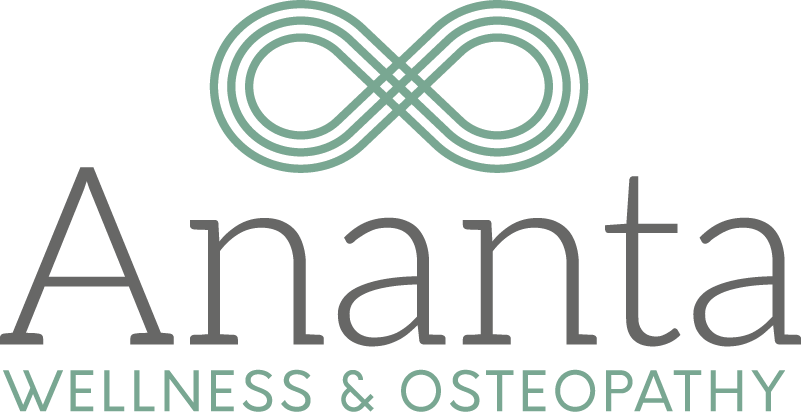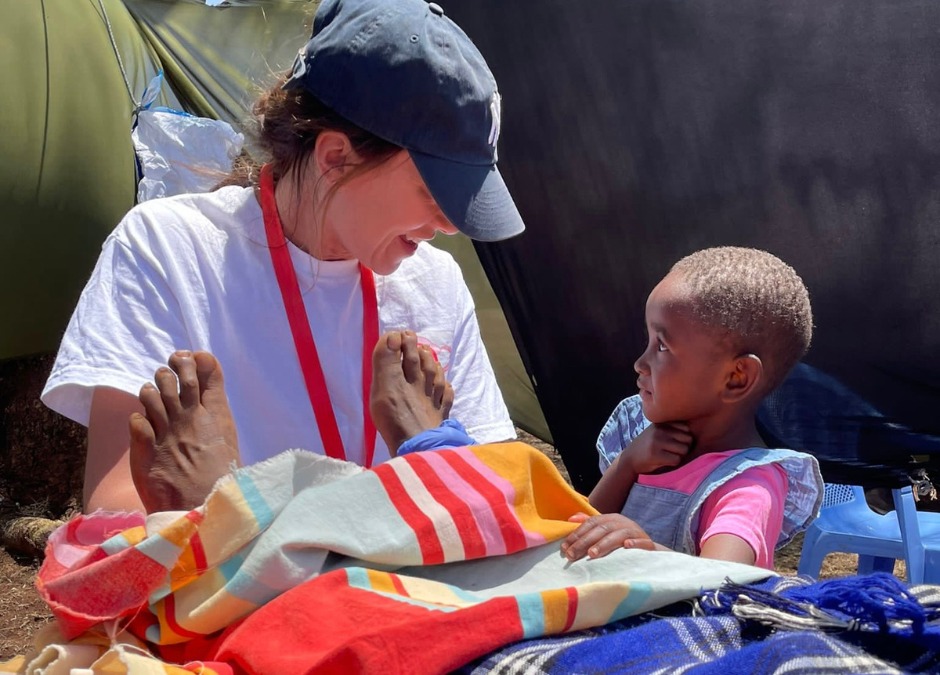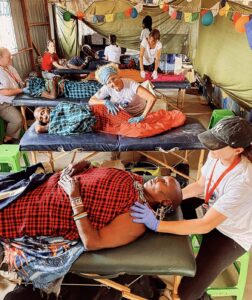As many of you know a dear friend and colleague of mine, Mel and I embarked on an experience of a lifetime last October where we joined the Divinity Foundation and other amazing humans to take part in their fall medical mission. We started this endeavour and fundraising campaign thinking it would be a “once” in a lifetime event – considering Mel and I have done a combined 9 humanitarian missions in Peru I don’t know what we were thinking – needless to say, shortly after I landed in Kenya – I knew I’d be back. As we begin the start of our fundraising campaign for 2024 I wanted to share a bit about our 2023 Medical Mission with the Divinity Foundation.
The Divinity Foundation was founded in 2008, by a British Osteopath, Navdeep Matharu who’s vision is to “one day have a more compassionate world, where the basic needs and rights of every human-being are fulfilled in order to have a more healthy and peaceful existence.” The Divinity Foundations objective is to provide care and support to orphaned, abandoned or impoverished children and mothers and fulfils that aim by pooling resources and voluntary skills of professionals globally. We are honoured to be a small part of their initiative and to have worked along side our new Divinity Family and couldn’t have done it without your support. The donations 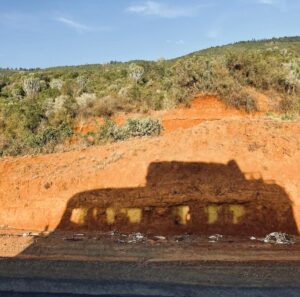 that you contributed in 2022/2023 went towards medications, food famine packs, feminine hygiene packets and children’s shoes; all which were distributed throughout Kenya by our team during the mission. In addition to the mission support, with your help we were able to donate an amazing $11,600 CAD towards the building of a much needed Maternity and Children’s Hospital in a medically isolated community in the Amboseli region.
that you contributed in 2022/2023 went towards medications, food famine packs, feminine hygiene packets and children’s shoes; all which were distributed throughout Kenya by our team during the mission. In addition to the mission support, with your help we were able to donate an amazing $11,600 CAD towards the building of a much needed Maternity and Children’s Hospital in a medically isolated community in the Amboseli region.
I’d love to take you on a literary road trip throughout Kenya and share with you the life changing journey we had the privilege to be a part of.
“Roads were made of journeys, not destinations”
Our team was made up of 4 Kenyan Doctors, 2 local Pharmacists, 2 Nurses, 2 Midwives, 9 Osteopaths, 5 logistical 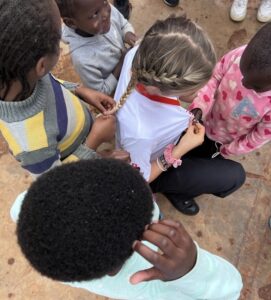 personnel and 30 local translators. After a day of orientation, our new Divinity Foundation family jam packed everything needed for the week into our bus and van…and we hit the road. Our first day of treatment was at a local Nairobi Orphanage and Rescue home, where 180 children safely live and study. Many of the children are either rescued from the streets, abandoned at the centres gate or from families where parents are struggling financially and are unable to provide care for their children. The children welcomed us like an ice-cream truck pulling up to a water park – running from all areas of the centre…with smiles from ear to ear and an innocent curiosity for blonde braids, tattoos and hand-clapping games. What a perfect, emotional and heartwarming start to our journey…a true demonstration of “it takes a village” and the profound impact that positive interactions and love can have on those most vulnerable. After a full day of treating, the kids shared with us a vibrant performance of song and dance – a reciprocity of medicinal laughter and love that I carried with me for the remainder of our journey. We then loaded the bus with extremely full hearts for a 3.5 hours drive to our next location, Naivasha.
personnel and 30 local translators. After a day of orientation, our new Divinity Foundation family jam packed everything needed for the week into our bus and van…and we hit the road. Our first day of treatment was at a local Nairobi Orphanage and Rescue home, where 180 children safely live and study. Many of the children are either rescued from the streets, abandoned at the centres gate or from families where parents are struggling financially and are unable to provide care for their children. The children welcomed us like an ice-cream truck pulling up to a water park – running from all areas of the centre…with smiles from ear to ear and an innocent curiosity for blonde braids, tattoos and hand-clapping games. What a perfect, emotional and heartwarming start to our journey…a true demonstration of “it takes a village” and the profound impact that positive interactions and love can have on those most vulnerable. After a full day of treating, the kids shared with us a vibrant performance of song and dance – a reciprocity of medicinal laughter and love that I carried with me for the remainder of our journey. We then loaded the bus with extremely full hearts for a 3.5 hours drive to our next location, Naivasha.
“Where flowers bloom, so does hope.”
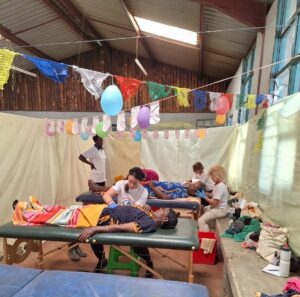
In Naivasha we travelled to a rural community where Mel and I saw our first wild zebras and giraffes on our “commute to work.” We set up our clinic at a local Flower Farm, on approximately 4000 acres of land, growing flowers that are exported to Europe. The farm employs and provides accommodations, schooling and medical care for 1000 families. We had the privilege of providing free treatment and medical care for these families as well as offering deworming medication to droves of kids from neighbouring communities. Here, the wear and tear of laborious and repetitive work conditions, with poor footwear and prolonged pesticide exposure was palpable. It was a long treatment day in a hot and humid, plastic draped greenhouse-like building, with no air flow and our first introduction to pit latrines for toilet facilities. A very necessary warm-up to the next adventure on the itinerary – Pokot.
“Seeing is different then being told.”
The next day involved a full day on the bus towards the Ugandan border as we travelled northeast to Pokot. Although long, we were 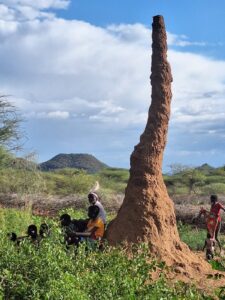 entertained by a “sing in your car” worthy play list, amazed by the termite towers on the side of the road and the highlight of buying locally forged honey and watermelons from the window of our bus. Pokot, an eastern part of Kenya, where the thorned African bush is dense, the ground is extremely arid and the temperatures are 40 degrees in the day and cool at night. Food and water is extremely scarce resulting in tremendous need for aid in all parts of this region. The Pokot are one of Kenyan’s last untouched tribes. They are proud people who until recently, remained aloof from the outside influences. Inevitably their traditional way of life and cherished culture will be challenged, impacting their innate capacity to survive in their very inhospitable environment. The women and girls wear intricate beading of large ringed necklaces and looped earrings that represent their culture, status and ceremony.
entertained by a “sing in your car” worthy play list, amazed by the termite towers on the side of the road and the highlight of buying locally forged honey and watermelons from the window of our bus. Pokot, an eastern part of Kenya, where the thorned African bush is dense, the ground is extremely arid and the temperatures are 40 degrees in the day and cool at night. Food and water is extremely scarce resulting in tremendous need for aid in all parts of this region. The Pokot are one of Kenyan’s last untouched tribes. They are proud people who until recently, remained aloof from the outside influences. Inevitably their traditional way of life and cherished culture will be challenged, impacting their innate capacity to survive in their very inhospitable environment. The women and girls wear intricate beading of large ringed necklaces and looped earrings that represent their culture, status and ceremony. 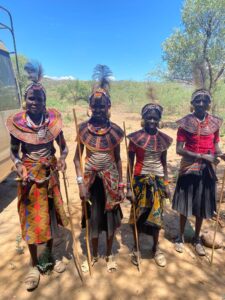 What we would consider dress for a special occasion, these women are adorned daily in their regalia, as if each day was a day of celebration. Despite societal weakness in comparison to the men and a voice that goes unheard or expressed in public forums and in their own homes, the women still find ways to express themselves through beauty, colour, dance and song. Pokot women and girls braid their hair tightly into thin braids, using red or brown clay to support in place, provide texture and inform community significance. They live in social polygamy, where the number of wives and children is proportional to a man’s wealth. The men dominate the decision-making process within the society, where a council of elders are responsible for maintenance of law and order, social disputes, ceremonies and economical development. Men were seen resting under trees, sitting on their hand-carved wooden stools, many with a knife belt and a thin stick, with some wearing a culturally significant metal ring used to eat meat and strike women.
What we would consider dress for a special occasion, these women are adorned daily in their regalia, as if each day was a day of celebration. Despite societal weakness in comparison to the men and a voice that goes unheard or expressed in public forums and in their own homes, the women still find ways to express themselves through beauty, colour, dance and song. Pokot women and girls braid their hair tightly into thin braids, using red or brown clay to support in place, provide texture and inform community significance. They live in social polygamy, where the number of wives and children is proportional to a man’s wealth. The men dominate the decision-making process within the society, where a council of elders are responsible for maintenance of law and order, social disputes, ceremonies and economical development. Men were seen resting under trees, sitting on their hand-carved wooden stools, many with a knife belt and a thin stick, with some wearing a culturally significant metal ring used to eat meat and strike women.
We slept in single man tents, pitched in the ground of a local church, with pit latrines and barren isolation on land subject to extreme flash flooding. In Pokot we set up remote clinics for three consecutive days; travelling long distances into the African bush, getting our bus and van stuck 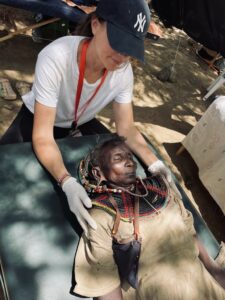 daily in dry river beds and sinking sand. Each day we were greeted by hundreds of villagers that traveled miles and miles by foot and walking sticks, resting on handcrafted Pokot signature stools when needed. We were visited by goats and camels moving in and around out triage and treatment sites and used “discrete” bushes as bathrooms. We provided free medical, pharmaceutical, osteopathic, nursing and midwifery care for over 1500 people and handed out children’s shoes to prevent parasites from borrowing through the souls of their tiny feet. At the end of our days, as darkness approached, we handed out food famine and hygiene packs to women lined up for as far as the eye could see. The scotching heat, the constant swarm of mozzies and black flies, ticks, ants and environmental vigilance for thorns all over the ground made for long days. Along with a seemingly never-ending queue of women and children seeking Osteopathic care, the confronting nature of infectious disease, fungal and eye infections, parasites and lice was steady. Here, sadly we were presented with many clinical cases of domestic abuse, rape, tribal torture, child marriages/mothers and the high prevalence of Type 3 Female Genital Mutilation (FGM).
daily in dry river beds and sinking sand. Each day we were greeted by hundreds of villagers that traveled miles and miles by foot and walking sticks, resting on handcrafted Pokot signature stools when needed. We were visited by goats and camels moving in and around out triage and treatment sites and used “discrete” bushes as bathrooms. We provided free medical, pharmaceutical, osteopathic, nursing and midwifery care for over 1500 people and handed out children’s shoes to prevent parasites from borrowing through the souls of their tiny feet. At the end of our days, as darkness approached, we handed out food famine and hygiene packs to women lined up for as far as the eye could see. The scotching heat, the constant swarm of mozzies and black flies, ticks, ants and environmental vigilance for thorns all over the ground made for long days. Along with a seemingly never-ending queue of women and children seeking Osteopathic care, the confronting nature of infectious disease, fungal and eye infections, parasites and lice was steady. Here, sadly we were presented with many clinical cases of domestic abuse, rape, tribal torture, child marriages/mothers and the high prevalence of Type 3 Female Genital Mutilation (FGM).
Despite the efforts to educate and share alternative ways for a girls right of passage – the FGM rate in Pokot remains at 95%. Type 3 FGM in this region involves the removal of the clitoris, labia minora and majora (inner/outer folds of the vulva), usually by an unsterile razor blade. Wounded edges are then stitched together by the thorns found on the brush, only leaving a small opening for urine and menstruation to pass. 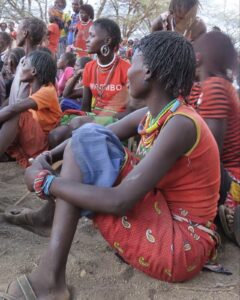 The seal is typically only cut open again for a male to enter or for giving birth, once complete, she will be again – resealed. In this region girls are then isolated with their legs bound for 14 days to allow for optimal healing and can be seen cloaked in dark fabric to signify their recent cut. The practise leads to a number of life long complications, including but not limited to excessive scarring, pain, chronic urinary tract infections, difficulties with child birth, anal/bladder fistulas and non-sterile ceremonial conditions leading to contagions such as HIV. Osteopathically, patients presented with high rates of lower back pain, immobile pelvis’, pain while urinating (many without the presence of infection), menstrual pain, abdominal and digestive pain, dural tension, inferior fascial strain, rigid pelvic floors, lower extremity internal rotation and the palpable multi-layered trauma presented both locally and systemically. It is difficult to fully understand why this practise remains given all the health implications it comes with. FGM is deeply entrenched in culture, intergenerational beliefs and pride, where Circumcisers are extremely revered in their communities and the role is often passed down through their linage. All one can do is be there to serve, to listen, to observe, to be open and to try and understand without judgement and the shadows of our colonial mindsets.
The seal is typically only cut open again for a male to enter or for giving birth, once complete, she will be again – resealed. In this region girls are then isolated with their legs bound for 14 days to allow for optimal healing and can be seen cloaked in dark fabric to signify their recent cut. The practise leads to a number of life long complications, including but not limited to excessive scarring, pain, chronic urinary tract infections, difficulties with child birth, anal/bladder fistulas and non-sterile ceremonial conditions leading to contagions such as HIV. Osteopathically, patients presented with high rates of lower back pain, immobile pelvis’, pain while urinating (many without the presence of infection), menstrual pain, abdominal and digestive pain, dural tension, inferior fascial strain, rigid pelvic floors, lower extremity internal rotation and the palpable multi-layered trauma presented both locally and systemically. It is difficult to fully understand why this practise remains given all the health implications it comes with. FGM is deeply entrenched in culture, intergenerational beliefs and pride, where Circumcisers are extremely revered in their communities and the role is often passed down through their linage. All one can do is be there to serve, to listen, to observe, to be open and to try and understand without judgement and the shadows of our colonial mindsets.
With our bodies layered with dirt, deet, sweat and sunscreen we loaded the bus and 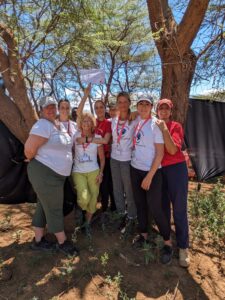 traveled from Pokot back to Nairobi for a night to shower, rest and load up supplies for the next week of our travels. It is on this long road trip back, where one begins to integrate the enormity of what we experienced over the last week. Although extremely difficult, on more levels then one can articulate, it is experiences like our time in Pokot that I will remember forever. It is here, in 2005, where Navdeep, CEO of the Divinity Foundation first fell in love with humanitarian work and began to dream a big dream. I feel incredibly honoured, grateful and extremely privileged to be in community with these peoples; not just to simply pass by and offer aid, but to treat, to serve, to laugh, to learn, to dance, to be in song with, to observe, to discover, to share, to communicate with the universal sign for “yes” and to be profoundly in awe. Pokot has left a lasting imprint and teachings that I have only begun to unpack – they will forever be held in my heart.
traveled from Pokot back to Nairobi for a night to shower, rest and load up supplies for the next week of our travels. It is on this long road trip back, where one begins to integrate the enormity of what we experienced over the last week. Although extremely difficult, on more levels then one can articulate, it is experiences like our time in Pokot that I will remember forever. It is here, in 2005, where Navdeep, CEO of the Divinity Foundation first fell in love with humanitarian work and began to dream a big dream. I feel incredibly honoured, grateful and extremely privileged to be in community with these peoples; not just to simply pass by and offer aid, but to treat, to serve, to laugh, to learn, to dance, to be in song with, to observe, to discover, to share, to communicate with the universal sign for “yes” and to be profoundly in awe. Pokot has left a lasting imprint and teachings that I have only begun to unpack – they will forever be held in my heart.
“The eye never forgets what the heart has seen.”
We are then off for the second week of our mission, travelling southwest for 7 hours to Amboseli, land of elephants and the 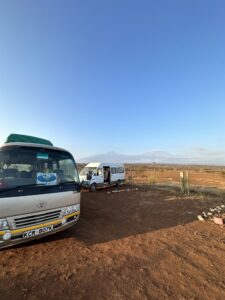 Maasai. We arrive at the Divinity Foundations project site of the FGM rescue centre, farm and Maternity and Children’s hospital. It is the dry season, so there are incidences of herds of elephants invading the compound at night…and sure enough we were surprised to wake up one morning to a broken metal gate, emptied water trough, ransacked vegetables and a downed fence line – all courtesy of one rogue male elephant. In this region there are teams of young Maasai Morans (young warriors) who have been trained to respond and safety herd away elephants. Maasai tribes live in traditional villages called Manyatta’s. Small huts, known as Boma’s are made of mud, ash and cow dung and are constructed in a wide circular formation with the help of thorned brush to keep their livestock in the middle, protected from predators like lions and cheetahs. Maasai women express themselves through intricate beaded jewelry, pattern and colour, where men are seen wearing a knife belt, draped in a traditional cloth of black and red checkers
Maasai. We arrive at the Divinity Foundations project site of the FGM rescue centre, farm and Maternity and Children’s hospital. It is the dry season, so there are incidences of herds of elephants invading the compound at night…and sure enough we were surprised to wake up one morning to a broken metal gate, emptied water trough, ransacked vegetables and a downed fence line – all courtesy of one rogue male elephant. In this region there are teams of young Maasai Morans (young warriors) who have been trained to respond and safety herd away elephants. Maasai tribes live in traditional villages called Manyatta’s. Small huts, known as Boma’s are made of mud, ash and cow dung and are constructed in a wide circular formation with the help of thorned brush to keep their livestock in the middle, protected from predators like lions and cheetahs. Maasai women express themselves through intricate beaded jewelry, pattern and colour, where men are seen wearing a knife belt, draped in a traditional cloth of black and red checkers 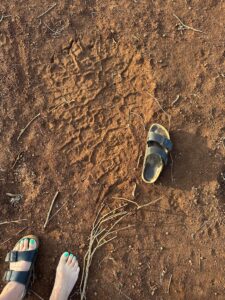 similar to our Canadian recognized buffalo plaid. Much like Pokot, Maasai women are destined to live a life of poverty and cultural oppression. Even with free primary school in Kenya only 48 percent of Maasai girls will enrol in school and only 10 percent will continue to secondary school. Typically, Maasai girls are circumcised between the ages of 11 to 13 and soon afterwards married to a man chosen by her father in exchange for cattle and cash. She will be one of multiple wives, and will have many children, regardless of her health or ability to provide for them. The Maasai are noble and dignified people, they to have proudly maintained their traditional lifestyle and cultural identity despite pressures of the modern world. Similar to Pokot, the Maasai have embraced a system that denies women basic human rights: the right to an education; the right to control her body, the right to choose whom and when to marry, and the right to express an opinion.
similar to our Canadian recognized buffalo plaid. Much like Pokot, Maasai women are destined to live a life of poverty and cultural oppression. Even with free primary school in Kenya only 48 percent of Maasai girls will enrol in school and only 10 percent will continue to secondary school. Typically, Maasai girls are circumcised between the ages of 11 to 13 and soon afterwards married to a man chosen by her father in exchange for cattle and cash. She will be one of multiple wives, and will have many children, regardless of her health or ability to provide for them. The Maasai are noble and dignified people, they to have proudly maintained their traditional lifestyle and cultural identity despite pressures of the modern world. Similar to Pokot, the Maasai have embraced a system that denies women basic human rights: the right to an education; the right to control her body, the right to choose whom and when to marry, and the right to express an opinion.
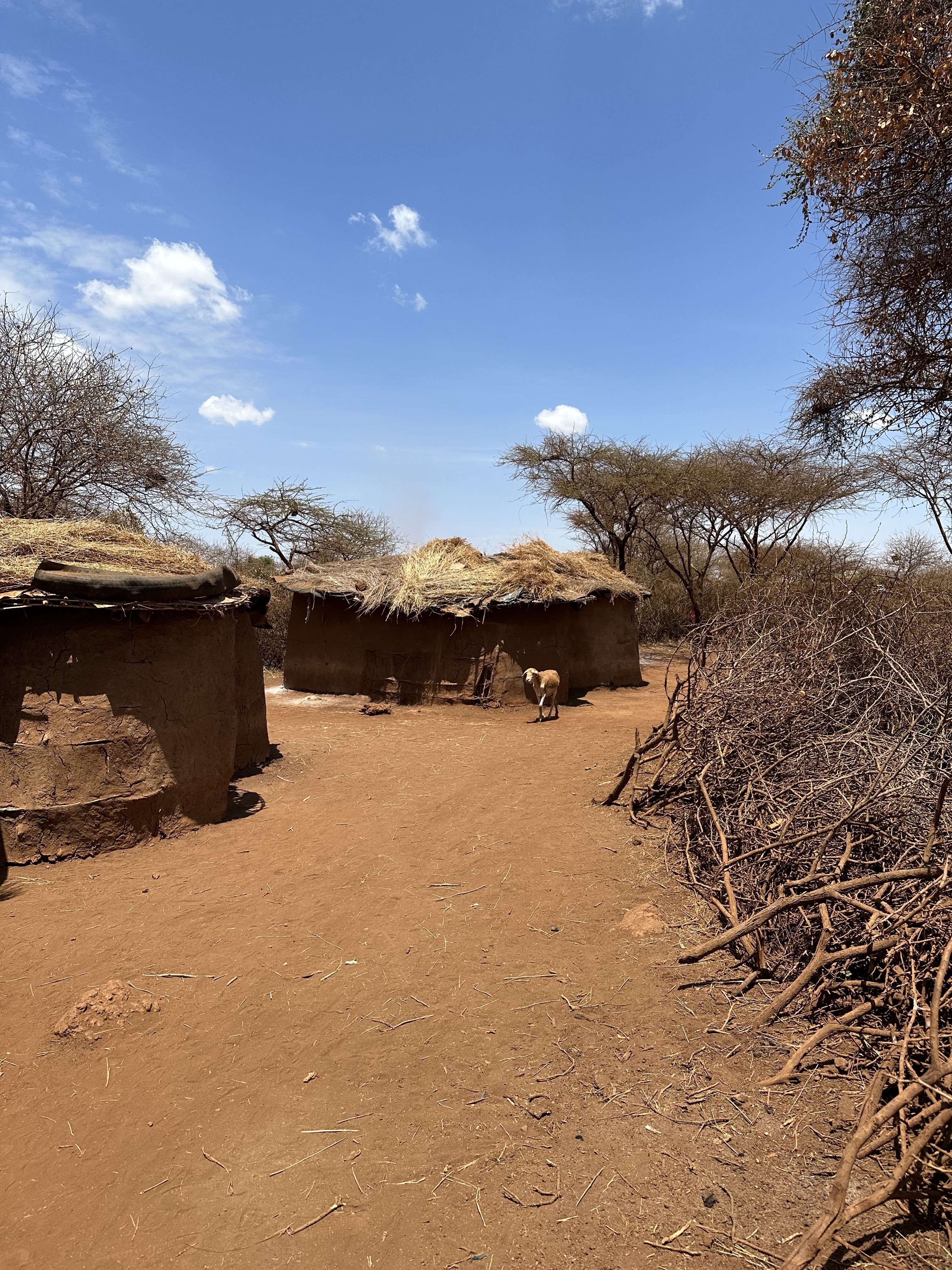
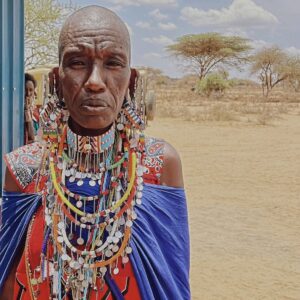
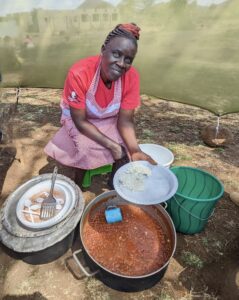
In Amboseli, much like Pokot, we travelled to three separate and remote regions in the area. Treating at the foot of Mt. Kilimanjaro for our first day, followed by long commutes through extremely arid and vast planes for days two and three. On our third day we travelled along Amboseli Lake – to our surprise it was completely dry, the impacts of Global warming are extremely hard to ignore in this region…from the dust devils ripping through 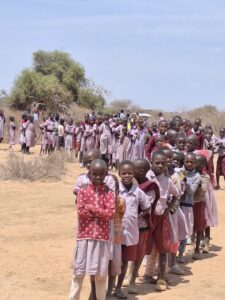 dry fields, to dried-up lakes and watering holes, to the mass migration and death of animals in the area. Each day we were welcomed with circles of prayer and song, giving us the renewed strength to continue another full day of treatment in our final week. We provided free medical, pharmaceutical, osteopathic, nursing and midwifery care for over 1200 people; and like other days we handed out food famine and hygiene packs to women lined up in the community of Kuku and dewormed hundreds of children in Meshenani. Osteopathically, patients presented with a high degree of chronic long standing pain, respiratory illness and chest pain, conjunctivitis, pelvic and bladder pain, trauma and parasitically driven digestive issues. Here, too, we sadly were presented with many clinical cases of abuse, child marriages and mothers, rape and the high prevalence of Female Genital Mutilation (FGM). The FGM rate in Amboseli has reduced in recent years, in comparison to the Pokot tribe…down to approximately 83%. Although the Maasai too remain deeply rooted in culture there does appear to be a small window of change surfacing around circumcision, education and family planning. To our surprise we had one girl, out of the hundreds of women and girls we treated, ask about contraceptive.
dry fields, to dried-up lakes and watering holes, to the mass migration and death of animals in the area. Each day we were welcomed with circles of prayer and song, giving us the renewed strength to continue another full day of treatment in our final week. We provided free medical, pharmaceutical, osteopathic, nursing and midwifery care for over 1200 people; and like other days we handed out food famine and hygiene packs to women lined up in the community of Kuku and dewormed hundreds of children in Meshenani. Osteopathically, patients presented with a high degree of chronic long standing pain, respiratory illness and chest pain, conjunctivitis, pelvic and bladder pain, trauma and parasitically driven digestive issues. Here, too, we sadly were presented with many clinical cases of abuse, child marriages and mothers, rape and the high prevalence of Female Genital Mutilation (FGM). The FGM rate in Amboseli has reduced in recent years, in comparison to the Pokot tribe…down to approximately 83%. Although the Maasai too remain deeply rooted in culture there does appear to be a small window of change surfacing around circumcision, education and family planning. To our surprise we had one girl, out of the hundreds of women and girls we treated, ask about contraceptive.
Our days were long, dusty and hot, with long commutes to and from the Rescue Centre. We experienced the tradition of three-stone cooking for lunch, comforts of pit latrines, and were visited by stray dogs, sheep and cows roaming through triage and treatment sites. We saw our first wild elephant and had the privilege to travel through the Amboseli National park on our last day where we saw wildebeests, zebras and flamingos. Amboseli and the Maasai captured our hearts and have certainly left a lasting imprint on our lives. The Maasai and their children have a brightness in their eyes, a warmth of embodied kindness, a palpable level of pride and an ease to connect that will forever be remembered. I was deeply humbled by their enormous hearts and eternally grateful to be welcomed as a visitor on their land and amongst its people.
“When we plant trees, we plant the seeds of peace hope.”
The Divinity Foundations Rescue Centre is built on Maasai land and encompasses all the healing properties of both the land and its tenders. The self-sustainable sanctuary is located in the hills on the foot of Mount Kilimanjaro, with the rich red earth cultivating a perfect location to fuel the future. Between solar power, a chicken coup, medicinal plants, fruits and vegetables – the centre is almost 100% sustainable, except flour and oil for cooking. The Rescue Centre houses and supports the futures of young girls whose bravery was greater than the cultural beliefs and nuances impressed upon them. Fleeing their homes and communities from planned FGM, child marriages, neglect, rape and abuse, the virgin myth and defilement by their own fathers. With open gates and arms the centre welcomes, feeds, houses, educates and pays for schooling with the support of sponsorship. Healing at the hands of the land, sport & play and the nurturing through safety in community and modeling. It was a complete privilege and inspiration to meet these young souls, spending each morning watching them run off to school and our last evening at the rescue centre treating them. What a beautiful way to end our days of treatment in Kenya, deeply rooted in why it all began – in the belief that children are the hope for a brighter peaceful future and it is their basic human right to be supported with care and love.
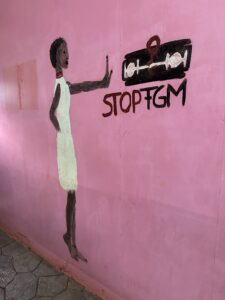

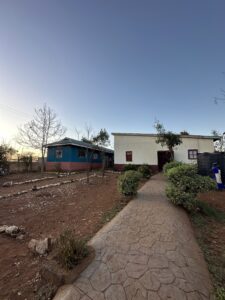
“If you want to go quickly, go alone. If you want to go far, go together.”
In only 8 days and the hard work of our incredible team – we treated 3,545 patients with free medical, pharmaceutical, osteopathic, nursing and midwifery care. We handed out 600 pairs of new shoes to kids, 800 personal hygiene packs to women and girls and distributed 1,650 food famine packs to those most in need. Sadly, every day and in every region we could’ve done more…handed out more food, more clothing donations, more medications, and more shoes…just more. Mel and I have both decided to go back to Kenya again for the fall mission of 2024 taking place in the middle of October and we’d love for you to join us again in our efforts. We will be fundraising again until October 2024 – baking up more cookies, selling chocolates, exciting raffle give-aways and more to come. We are looking to raise a minimum of $10,000 CAD to go directly to the Divinity Foundation for supplies, food and medications needed for our Medical Mission in October, with any additional funds raised going towards completing the Maternity and Children’s Hospital. Join us in creating impactful change for the lives of so many women and children in Kenya. No donation is too small, no words of support go unheard and every single like, share or conversation will sincerely be appreciated.
Donation link to > Join Us < and follow us on our Instagram Account.
From every cell in my being, deep love and gratitude. Thank you.
Asante Sana.
